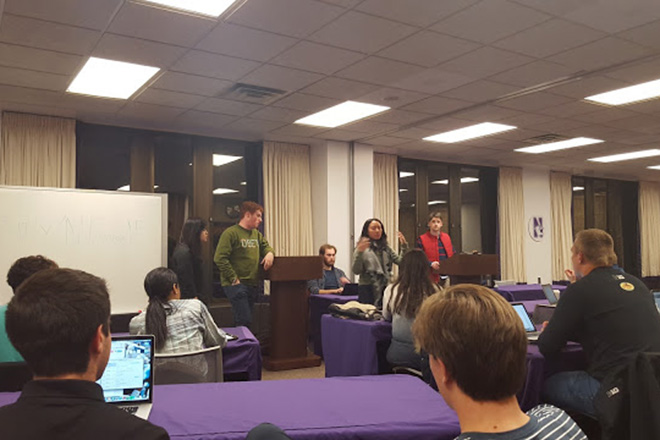
ASG started off the quarter by addressing one of the biggest issues on college campuses, and is calling on Northwestern’s administration to increase resources for its sexual assault prevention program. The report released on Wednesday night also called for more transparency in the way that sexual assault cases are handled and for greater attention towards the needs of minority groups on campus.
Weinberg senior Erik Baker and the student life committee, alongside sexual assault interest groups like SHAPE and MARS, came to the conclusion after meeting with with students, campus leaders and receiving responses from an online survey during the It’s on Us Action week last November. Baker said that students don't trust CARE, the sexual assault resource center, and therefore don’t use it. He praised the program for its counseling services, but said they were often wasted because the university failed to make students aware of its offerings.
“CARE, which is a one of a kind and unique resource, has very poor visibility,” Baker said. “Most people don’t know what is it, see it’s marketing, see its purpose or understand its function.”
Baker called for Northwestern to provide resources for CARE to market itself year-round, but he said that wouldn’t be enough. The report calls for CARE to fundamentally rewrite and streamline their policy so students can easily understand the process and access services.
Last year, the university rewrote their disciplinary system but Baker said it failed to publicize these changes. Some of the new policies that activists like Baker called for, such as the one stating that a student can’t give consent while incapacitated, are bogged down in pages of jargon. Moreover, Baker added, survivors don’t trust the system to actually bring them justice because the university has consistently refused to release data on how many cases they receive and how many of those accused of committing sexual assault are actually reprimanded.
“The process is very intimidating and complicated, so people– especially someone who's just been through something very traumatic– don’t want to put the effort to navigate this bureaucratic system,” Baker said. “So the university needs to be proactive.”
The report also called for the university to state that under its Amnesty through Responsible Action intervention program, students would not face alcohol-related sanctions for reporting sexual assault. Baker said that right now the policy is ambiguous, preventing many bystanders from reporting sexual assault if alcohol was involved.
Baker emphasized that the changes must give special emphasis to students of color and LGBTQ+ students, who face higher rates of sexual violence. A university campus climate survey released in September found that queer students face unwanted sexual penetration at nearly double the rate of their heterosexual peers. Students of color were three percentage points more likely to face sexual harassment than whites.
The It’s On Us campaign started in 2014 as a means of raising awareness for sexual violence prevention nationally. The purpose of the 2015 initiative at Northwestern was to find concrete policy objectives to combat the problem. These recommendations will be presented in a detailed report to a administrators.
On a lighter note, the vice president of sustainability said ASG was planning to explore creating an energy-producing-dance floor for Dance Marathon. The new technology captures the energy from the dancers’ movements to power LED lights.
ASG is planning to make its “A Day in The Life” project in which a university administrator shadows students for a day to learn about a daily student life, into a permanent program. Sign up and show Morty what it’s like to sit through a two hour lecture on real analysis.
Towards the end of the meeting, senators unanimously voted to make Macs Vinson the official Student Affairs Vice President. Vinson had been serving on an interim basis since Parag Dharmavarapu stepped down to join the White House in the fall.